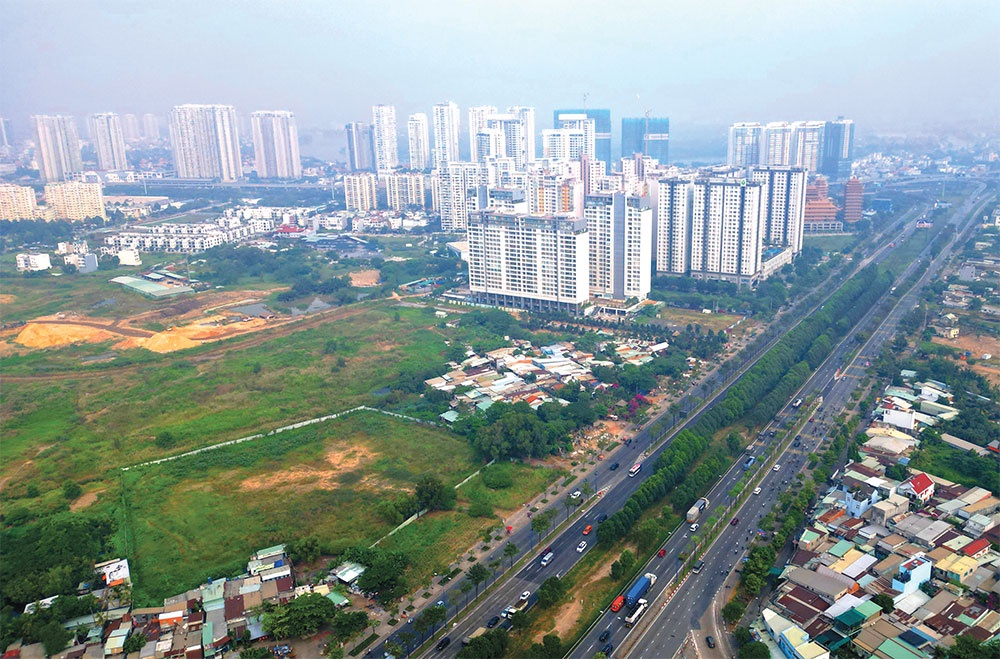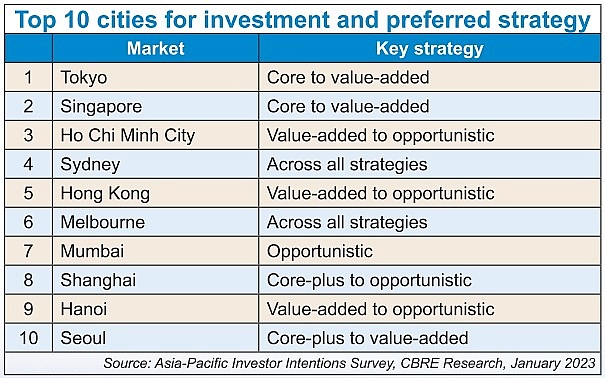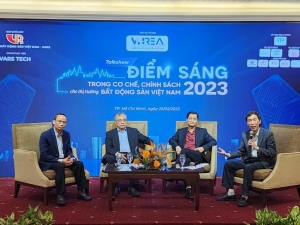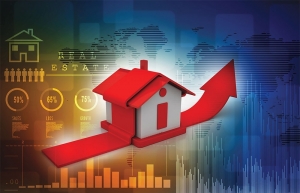Big appetite still apparent in real estate
According to the 2023 Asia-Pacific Investor Intentions Survey released by CBRE Research in January, for the first time, Ho Chi Minh City and Hanoi made it to the top 10 for cross-border investment. Placing third overall, Ho Chi Minh City is even more attractive than Australia.
 |
| Big appetite still apparent in real estate |
Foreign investors interested in the residential property market in Vietnam are mostly from Asian markets such as Hong Kong, Singapore, China, South Korea, and Japan.
With an urbanisation rate of 42 per cent, in the eyes of investors, Vietnam still has a long way to go and has a growing middle-class population, which makes it an attractive destination for capital.
Singaporean investors have started the year with a wave of activity, including several large-scale deals.
Keppel Land, a developer with a portfolio of more than 20 projects and total registered capital of $3.5 billion worldwide, signed an MoU with Khang Dien Group on February 10 to collaborate on the development of residential projects as well as sustainable urban developments in Ho Chi Minh City.
Keppel Land CEO Louis Lim confirmed the company was committed to expanding its presence in Vietnam, a key market where it sees long-term growth potential.
Sembcorp Development of Singapore earlier in February also signed an MoU with Becamex IDC on cooperation to develop five green, smart, and sustainable industrial parks in Vietnam within the next three years, at a total investment of roughly $1 billion. The parks aim to meet green, smart, and sustainable standards, using Industry 4.0 tech for infrastructure development and management.
 |
In the report “Vietnam Real Estate: Perspectives from China and Southeast Asian Countries” by PropertyGuru Group, Vietnam’s open economic policy and integration into global supply chains have made growth possible. Therefore, a resilient supply chain is key to Vietnam’s economic strength and increasing the attractiveness of real estate to foreign investors.
If Vietnam’s transport infrastructure of seaports, highways, high-speed railways and airports is expanded and completed, real estate in Vietnam will be a more attractive destination for foreign capital, the report said.
| Henry Chin-Global head of Investment CBRE Asia-Pacific | |
Interest rates are vital for real estate right now, as they strongly influence demand among global investors. Many buyers cannot arrange finance for any deals. It is the same for Vietnam, and leaves the market very quiet. Interest rates are expected to become more stable, leaving investors more confident in their investments. We could see the market recover in the second half of this year. In addition, people from Asia-Pacific are looking at China +1 opportunities, and Vietnam is an ideal destination. Local investors and global companies are all looking to diversify their investments and Vietnam could benefit hugely from this. People are looking for structural opportunities, as because of the young population and strong GDP, manufacturers are coming to Vietnam and overseas funding remains strong. Investors globally and in Asia-Pacific said that they would drive their investments to Vietnam this year. In my private talks, nearly all global investors said that India and Vietnam were the main priority. However, they are worried about the slowdown of the economy worldwide, which means companies are looking to minimise their operations and reduce rental and fees, with reduced demand expected to impact real estate developers, owners, and investors. In Vietnam, logistics and warehouses, along with retail and property, remain a top interest of global investors. In addition to these are lifestyle properties, data centres, and cold storage facilities. The biggest concerns from global investors in Vietnam, meanwhile, are clearing regulations, finding eligible local partners, and liquidity issues. | |
| Nicolas Michaux-Managing partner Alpha Prime Hong Kong | |
A young, dynamic, qualified, and affordable workforce is making the country very attractive to investors. As for the real estate market, different factors have affected the foreign investment flow, including delays in the handover of several projects, which affect global returns for investors; an increase in interest rates and credit restrictions; increases in construction costs;, and a boom in the market prices over the past few years. But overall, the fear of a globalised crisis has led foreign investors to put their projects on hold. This wait-and-see policy has had an obvious and immediate effect on the real estate sector. That being said, the sector’s contribution to the country’s GDP is so crucial that the market needs to be supported by the authorities, to avoid direct and indirect impacts on hundreds of other industries and the economy as a whole. While we foresee a growing withdrawal from the United States on the international scene, and an inevitable lasting recession in Europe, the continents of Africa and Asia remain two poles of attraction. Asia has the added advantage of an already mature and organised market, with greater geopolitical stability, where growth will probably find its place more easily in 2023. Vietnam has great assets during this period of uncertainty. | |
| Marc Townsend-Chairman Arcadia Consulting Vietnam | |
Even without knowing much about the local real estate market here, foreign investors are attracted to the three main drivers of a growing middle class and their expanded affluence, rising affordability, and rapid urbanisation that continues to escalate. Even with the global and regional headwinds in 2021-2022, this interest in Vietnam has not changed, particularly for industrial assets. However, what could be different in 2023 is that there will be a recalibration of land values and residential prices. Many observers have watched with interest how land and residential values have risen sharply over the last eight years, eventually fuelling a hotbed of distress and liquidity strains. Foreign investors are hoping that the days of upwards-only capital values, easy access credit, and an over-confident developer community may take pause for breath. I feel that everyone is suffering currently, including local and foreign developers. However, the majority of foreign developers active in Vietnam today have historically been quite conservative and less exposed to the slowdown in sales and the tightened monetary policy from banks, partly because they have access to overseas funding. However, all developers have been affected by the slowdown in the planning and approval process. A general lack of transparency and consistency, perceived corruption, and a challenging risk environment have also kept many big-ticket investments away. This year could well be different, as some local developers may be forced to accept that things have changed, and land prices may go down as well as up. |
 | Real estate market to reheat gradually in 2023, say experts With a series of legal bottlenecks being removed and revamped credit policies to be applied in the near future, the real estate market is predicted to bounce back and be prosperous by the end of the third quarter (Q3) of 2023. |
 | Real estate bailout eyes credit recovery The Vietnamese government and banks have developed a strategy to improve the credit status of Vietnamese real estate businesses by offering a $5 billion loan package. |
What the stars mean:
★ Poor ★ ★ Promising ★★★ Good ★★★★ Very good ★★★★★ Exceptional
Related Contents
Latest News
More News
- Construction firms poised for growth on public investment and capital market support (February 11, 2026 | 11:38)
- Mitsubishi acquires Thuan An 1 residential development from PDR (February 09, 2026 | 08:00)
- Frasers Property and GELEX Infrastructure propose new joint venture (February 07, 2026 | 15:00)
- Sun Group led consortium selected as investor for new urban area (February 06, 2026 | 15:20)
- Vietnam breaks into Top 10 countries and regions for LEED outside the US (February 05, 2026 | 17:56)
- Fairmont opens first Vietnam property in Hanoi (February 04, 2026 | 16:09)
- Real estate investment trusts pivotal for long-term success (February 02, 2026 | 11:09)
- Dong Nai experiences shifting expectations and new industrial cycle (January 28, 2026 | 09:00)
- An Phat 5 Industrial Park targets ESG-driven investors in Hai Phong (January 26, 2026 | 08:30)
- Decree opens incentives for green urban development (January 24, 2026 | 11:18)




 Tag:
Tag:




















 Mobile Version
Mobile Version